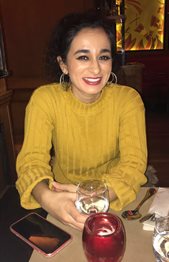
Yasmin Dhuga – Intercalating (Year 4)
1. What did you decide to intercalate in and where?
Remote Medicine at Imperial College London.
2. How is/was your experience of intercalating?
Overall, I enjoyed my intercalated year for many reasons. Firstly, I studied something that I am really interested in and that is not covered in the BSMS curriculum. I met interesting people who would come in and talk to us about their experiences of working as doctors in remote environments. We learnt about the medical emergencies they faced, as well as how to deal with medical problems when they arise in environments that are sometimes hours or days away from the nearest hospital. I loved seeing how passionate they were about their expedition experiences, and there were also good opportunities to network with people who would be happy to advise about how to get into their field.
Secondly, there was a heavy focus on developing our research skills throughout the year. By the final module, we had to plan and conduct a research project (our course was meant to go on an expedition to Nepal and carry out our research, but this, unfortunately, got cancelled due to the COVID-19 pandemic). I am not a fan of research, but this intercalated year helped to develop particular skills that are important to have as a doctor, for example, being able to critically appraise studies. Some people also had the opportunity to publish their research projects.
Finally, I enjoyed being in London for the year. I knew I didn’t want to intercalate in Brighton, because I wanted to experience life in another city. There were loads of opportunities to get involved in things, both inside and outside of the university. I joined a dance group and was busy preparing for a show called East Meets West, which unfortunately didn’t take place, but I was still able to keep up with my hobbies.
I’d heard a lot about intercalation being more relaxed than medicine, but this wasn’t the case for me. My course was very full-on from the very first term. Initially, this was a shock, but I soon got used to the pace of things. The course was also new for the year I started, so we were almost like the ‘guinea pig’ year. Things didn’t always go to plan, but the staff were really good and were constantly asking for feedback to improve the way things are delivered in future years.
3. What piece of advice would you give to anyone thinking of intercalating?
- Figure out if there is a particular location you want to be in, a lot of people decide to go home for the year, but figure out what is important for you.
- Make sure you are genuinely interested in the course you are going to be studying. You’re going to be studying a particular topic in great detail which will be really hard if you’re not passionate about the topic.
- Do your research around the course and make sure you are happy with the way you are assessed. At Imperial they scrapped all the exams for all the science intercalated degrees – you have multiple assignments throughout the year.
- Talk to people who have studies the courses you are interested in, find out what they liked, what they didn’t like and see if that fits with what you are hoping to gain from the year.